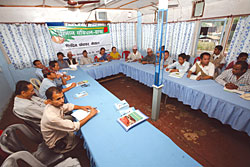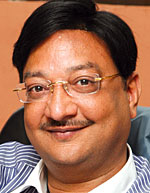 KIRAN PANDAY |
Himal Khabarpatrika: Why are ethnic fronts necessary when we have political parties?
Kamalraj Nembang (Joint Secretary, Federal Limbuwan State Council): The unitary structure doesn't represent the country's diversity, so Rais and Limbus have formed fronts to demand federalism based on history and ethnicity rather than geography and administration. The fact that even economically well-off Limbuwan residents support Limbuwan proves that the problems this country faces are rooted in ethnicity, not class.
Dilendra Subba (President, Limbu Language Development Organisation): Nepal's problems are rooted in both ethnic and class differences. Those who consider class issues to be primary are seeking to retain the status quo, so Limbuwan and Khumbuwan residents have had to push for ethnic federalism through various fronts. Non-Limbu speakers have not been able to understand what I've had to experience as a Limbu speaker.
Labhang Chemjong (Federal National Democratic Front): The big parties don't understand the reality of Nepal. Not until we deal with the ethnic problem can we fix the class problem.
How will an ethnic federalist Nepal safeguard the rights of minorities?
Bir Bahadur Dhamala (Dalit Upliftment District Coordination Committee): Ethnic federalism won't help Dalits. Ever since this movement began two or three years ago, nobody's seriously addressed Dalit rights. Only if the movement to establish a Dalit province in the west is supported by those espousing ethnic federalism will Dalit concerns be adequately addressed.
Lokendra Ale Magar (President, Nepal Federation of Indigenous Nationalities, District Coordination Council): Once a Limbuwan province is established, non-Limbu residents will have nothing to fear. But if the rights of indigenous communities are not enshrined in the new constitution these communities do not have to recognise it.
What are the relations between those supporting Limbuwan and those opposed to it in Panchthar?
Chhabi Banskota (President, NGO Federation of Nepal): It may not be fair to blame the parties advocating Limbuwan but persons linked to them are indulging in extortion. There have been slogans against Bahuns. Some in the pallo-Kirat have even denied people the right to buy or sell land. However, such activities are on the decline lately, and the situation isn't as bad as people elsewhere think it is. The leaders at least are of the opinion that we must work together.
Laya Banskota (CPN-UML): The extreme slogans of Limbuwan supporters may have sowed some fear but the actual situation is not that bad.
Lekhnath Khatiwada (President, Federation of Nepalese Journalists): In the last year, there have been about a dozen violations of press freedom on the part of Limbuwan supporters. We have had to self-censor ourselves. There is also a parallel justice system.
Kamalraj Nemwang: Limbuwan residents know they cannot obtain their rights by disrupting communal harmony. If anybody does so in the name of Limbu rights then the press must expose this.
Dilendra Subba: I've heard the slogan 'Those Opposed to Limbuwan Beware', but that's about it. If it's the case it must be the work of those who don't want Limbuwan.
Mitra Lingden (central member, Federal National Democratic Front): It's not true that there were attacks on the press. We have been conducting protests and coming up with slogans but haven't done anything wrong. Our slogan 'Those Opposed to Limbuwan Beware' should not be interpreted negatively.
How can Limbuwan supporters and the state come to an agreement?
Jaya Rijal (Vice-Chairperson, Nepali Congress): Limbuwan residents have been respecting the ideal of communal harmony. But the leaders of ethnic fronts have perhaps not been able to educate their cadres sufficiently.
Raj Kumar Bhandari (Secretary, CPN-UML): This is the right time to demand Limbuwan's rights. But it seems the state is not ready to grant these demands, and those in the movement have been unable to present their case responsibly.
Sant Kumar Rai (Secretary, Nepal Bar Association): Those in the movement should focus less on whether all their demands have been met and more on whether a constitution is drafted that doesn't discriminate against any ethnicity.
Rupnarayan Jabegu (President, Teachers' Union): The main political parties should invite those agitating for their rights for discussions. Experts could help decide what kind of federalism is acceptable.
Lokendra Ale Magar: The demands of the movement should be addressed without disturbing religious or ethnic harmony. If the state looks at our demands in the right light, then they will seem entirely reasonable.
'Need to be flexible about Hindi'
Mahendra Dhoj GC, NC CA member, Nawalparasi-2
How have you spent your time in the CA? 
It's been a very frustrating 13 months because we haven't met people's expectations. We've dashed whatever hopes they had following the restoration of democracy.
Will the constitution be written on time?
Problems don't last forever, so I'm still hopeful. The constitution is the chief law that binds together various communities, ethnic and linguistic groups and religions. If the leaders put aside their differences, then the constitution will be written on time.
Unicameral or bicameral system?
A bicameral system will be best, since a unicameral system is a communist ideological brand. I don't want communist rule to be instituted in the name of the people. So the committee determining the form of legislative system should institute a bicameral system with a lower and upper house. I'm a member of that committee. The Maoists have delayed the constitution-writing process by raising the issues of a multi-member constituent electoral system and a unicameral assembly.
What do you think about the Madhesi demand to make Hindi the state language?
Some want Hindi, others English as the official state language. In my view, we don't need to be so rigid about language, so there's no need to campaign for one so forcefully. If parliamentarians in India are allowed to speak Nepali in their House, then what's the problem with allowing people to speak Hindi in ours?
What will it take to get the constitution-writing process going again?
The leaders must put their selfish interests aside and cooperate. If that happens, then whatever people outside the House do, the constitution will be written.
'Need national government'
Madhusudan Agrawal, MJF CA member, Kathmandu
What do you think of the CA's work so far? 
Although the constitution-writing process is going on slowly, the development and security situation hasn't improved at all, largely because of our stubborn party chiefs.
Will the constitution be written on time?
If the big three parties cooperate then there's no need to panic.
Why hasn't your committee, the Committee on the Distribution of Natural Resources, Financial Rights and Public Revenue submitted its preliminary draft yet?
Committee members just haven't been able to patch up their differences. Many pretend to be independent thinkers but blindly follow party orders and ideology.
You're a businessman, how did you end up in the CA?
I wasn't elected. Upendra Yadav nominated me since he wanted somebody who could speak about economic issues. I wasn't involved with any party before.
What do you think about 'One Madhesh One Pradesh'?
More important than the identity of the province is that it really is autonomous.
Do you think Hindi should be made an official state language?
Since everyone speaks Nepali, it should surely be made an
official state language. But we should consider giving Hindi that status too, since Mathili, Bhojpuri and Tharu speakers can easily understand it.
What needs to be done so the constitution is written on time?
The big parties need to cooperate and put the people's aspirations ahead of their own and form a national unity government.


